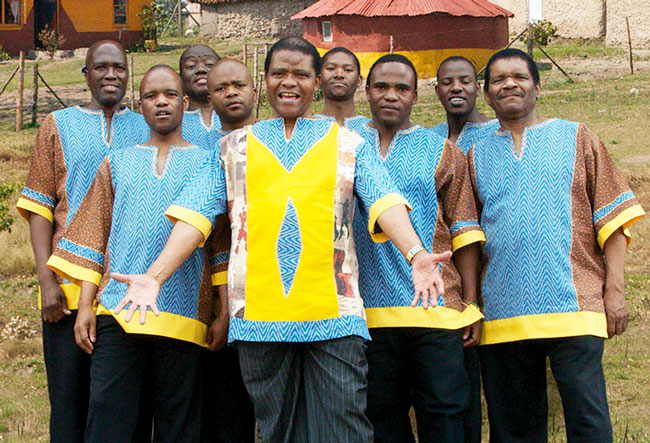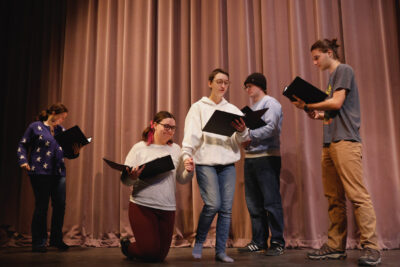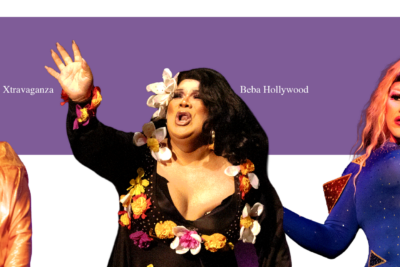Many people will likely recognize Ladysmith Black Mambazo from their prominent role on Paul Simon’s Grammy-winning album Graceland, but their accomplishments are much broader than a single cameo.
The group boasts over 50 albums in addition to 14 Grammy nominations and three Grammy awards. Ladysmith Black Mambazo was founded in the early 1960s by a man named Joseph Shabalala, a factory worker from Ladysmith, South Africa.The group sings in the isicathamiya tradition of a cappella music and began when black mine workers in South Africa sang together as a way to recuperate after six days of grueling labor underground. The various groups eventually began to compete with one another, each trying to outdo the other in their singing ability.
Ladysmith Black Mambazo’s singing was so impressive that they were eventually banned from competing at events, though they could still sing in them as entertainment.
The group’s name is based both on the origin of the group and a sense of pride in what they do. The biography on the group’s website sums it up well.
“Ladysmith is the name of Joseph’s hometown, black [is] a reference to the oxen, the strongest of all farm animals and mambazo [is] the Zulu word for chopping axe, a symbol of the group’s ability to ‘chop down’ any singing rival who might challenge them.”
Though the group’s founder recently retired, Shabalala’s son Thamsanqua now leads the singers. In an interview a year ago on radio station KEXP, host Darek Mazzone asked Thamsanqua how he hoped to continue the legacy of his father.
“[My father] taught us to work together,” he said, “to respect one another, to respect the work that we are doing, which is to spread the message of peace, love and harmony throughout the world. So that is what we are intending to do.”
Ladysmith Black Mambazo’s mission to spread peace and love brought them to Goshen College in 2003, and the faculty and staff at the Music Center are very happy to see them return.
“They’re somebody who people have, throughout the years, wanted to bring back because they were a memorable group,” said Brian Mast, managing director of the Music Center. Mast attributes the group’s popularity to their incredible musicianship, as well as their engaging stage presence.
“I love the visual element,” said Mast. “They perform standing in a line or a semicircle, and they have this choreography that they do. Arm movements, leg movements and stomping that’s not over the top, but it’s really engaging.”
Bev Lapp, chair of the music department, looks forward to the opportunity to hear music from outside the Western tradition.
“I’m excited about the opportunity to hear the music presented authentically and expertly,” Lapp said, “by artists who are from the culture and country that the music represents.”
Though the audience may come to hear music that is new and exciting, Lapp also believes that many in the audience will connect to the music because of a love for vocal harmony.
“[This type of music] is very close to our hearts here at Goshen because of our hymn singing tradition. So, it’s both extremely different and connected in a way.”
“The connection, however, will go deeper than the music,” says Marcia Yost, executive director of the Music Center.
Yost has seen Ladysmith Black Mambazo perform at least three or four times before, and every time, it has been an intense, immersive experience.
“The music is very exciting, very emotional, very human,” said Yost, “and as I watch them perform, one of the treasures that it brings to me is that I see how they become so totally taken by their music. It’s not only a musical experience for me, it’s a human one.”
Yost urges everyone to take advantage of the wonderful opportunity to see Ladysmith Black Mambazo because of their affinity for drawing the audience into their story.
“When I watch a group like that perform, it becomes more than about the music for me, and I think that’s true for everyone. When people come to listen to them perform, they’re drawn into a culture, they’re drawn into a spirit, and there’s something about that that goes across political, racial, cultural binds to draw us together.”
Ladysmith Black Mambazo will perform at 7:30 p.m. on Friday, Feb. 10 in Sauder Concert Hall. $10 student tickets are available at the Welcome Center and at the door.


